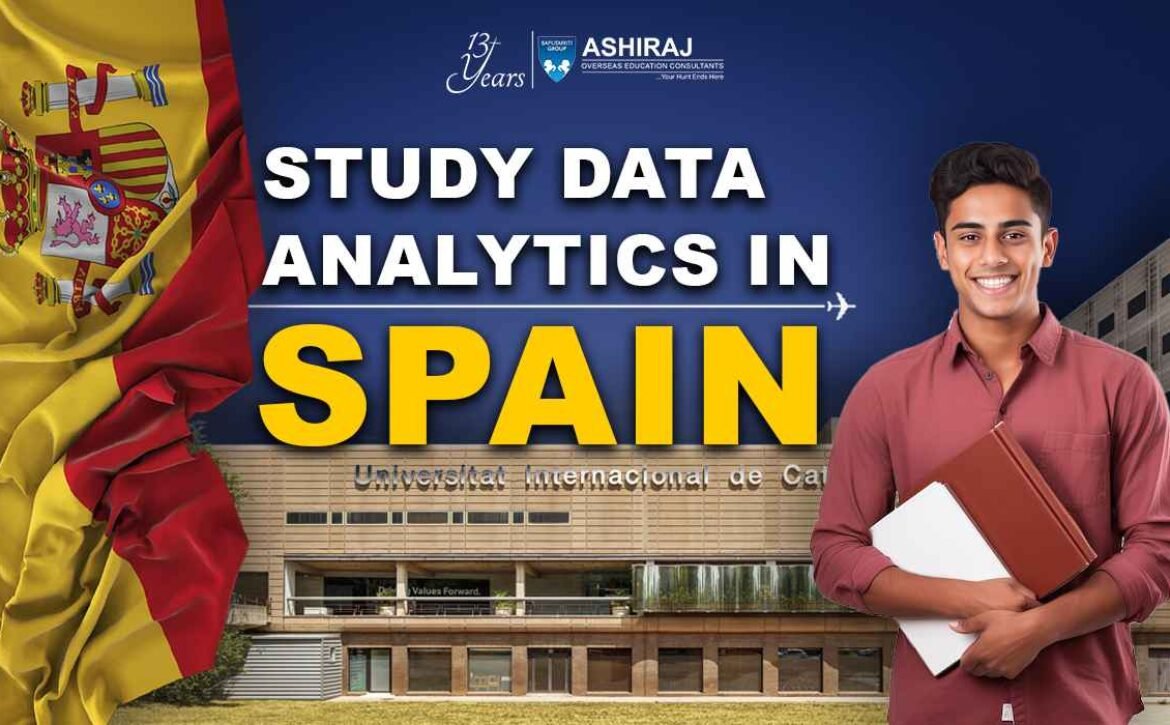
Data Analytics in Spain
Data Analytics in Spain has emerged as a dynamic and rapidly growing field, fueled by the country’s vibrant technology ecosystem and increasing demand for data-driven insights across industries. As one of the leading economies in Europe, Spain offers a fertile ground for professionals and students alike to delve into the realm of data analytics. With a rich cultural heritage and a thriving startup scene, Spain provides a unique backdrop for exploring the intersection of data science, technology, and business innovation.
In Spain, Data Analytics programs and initiatives are gaining momentum in both academic and industry sectors. Universities and educational institutions offer comprehensive courses and degrees tailored to meet the evolving needs of the data analytics field. Additionally, businesses in Spain are increasingly recognizing the value of harnessing data to drive strategic decision-making and gain a competitive edge in the market. Thus, Data Analytics in Spain presents a promising landscape for individuals keen on exploring the vast potential of data-driven insights and innovation.
Why to Study Data Analytics in Spain?
- Growing Industry Demand:
Spain’s economy is embracing data analytics across sectors, creating abundant job opportunities for skilled professionals.
- Strategic Location:
Situated in Europe, Spain provides access to a diverse market and proximity to major business hubs, enhancing networking and career prospects.
- Quality Education:
Spanish universities offer high-quality data analytics programs with a blend of theoretical knowledge and practical skills development.
- Rich Cultural Experience:
Studying in Spain provides not just academic growth but also exposure to a rich cultural heritage and vibrant lifestyle.
- Innovation and Technology:
Spain is fostering innovation in technology and entrepreneurship, offering a conducive environment for data analytics research and development.
- Language Opportunities:
Learning Spanish alongside data analytics can broaden career opportunities, especially in Spanish-speaking markets.
- Industry Collaboration:
Many Spanish universities collaborate with industry partners, providing students with real-world projects and internships to apply their data analytics skills.
- Diverse Career Paths:
Data analytics opens doors to diverse career paths, including data science, business intelligence, machine learning, and more, catering to varied interests and aspirations.
Studying Data Analytics in Spain offers a unique blend of academic excellence, cultural immersion, and promising career prospects, making it an attractive destination for aspiring data professionals.
Top Universities to Study Data Analytics in Spain
Rank | University | QS World University Rankings 2023 | Type of University | Average Annual Fees | Programs Offered |
1 | University of Barcelona | 186 | Public | €1,000 – €3,000 | Master in Data Science, Data Analysis |
2 | Pompeu Fabra University | 224 | Public | €1,000 – €3,500 | Master in Big Data Analytics, Data Mining |
3 | Autonomous University of Madrid | 234 | Public | €800 – €2,500 | Master in Business Analytics, Data Visualization |
4 | Complutense University of Madrid | 281 | Public | €900 – €2,300 | Master in Data Science and Big Data |
5 | Polytechnic University of Catalonia | 291 | Public | €1,200 – €3,000 | Master in Data Science, Artificial Intelligence |
Spain boasts several esteemed universities offering top-notch programs in Data Analytics. The University of Barcelona, ranked 186 in the QS World University Rankings 2023, provides a Master in Data Science among other programs. Pompeu Fabra University follows closely, offering a Master’s in Big Data Analytics and Data Mining. The Autonomous University of Madrid offers a Master’s in Business Analytics and Data Visualization. The Complutense University of Madrid and the Polytechnic University of Catalonia also feature strong programs in Data Science and Big Data, contributing to Spain’s thriving landscape in Data Analytics.
Course Curriculum for Data Analytics in Spain
- Foundational Concepts:
Introduction to data analytics principles, statistical methods, and data visualization techniques.
- Programming Languages:
In-depth training in programming languages such as Python, R, and SQL for data manipulation and analysis.
- Data Mining and Machine Learning:
Exploration of data mining algorithms and machine learning techniques for predictive modeling and pattern recognition.
- Big Data Technologies:
Study of big data frameworks like Hadoop and Spark for processing and analyzing large datasets efficiently.
- Business Intelligence:
Understanding how data analytics drives business decisions, including topics like data-driven decision-making and business analytics tools.
- Data Warehousing and Management:
Techniques for storing, retrieving, and managing data in databases and data warehouses.
- Ethics and Privacy:
Discussion on ethical considerations, privacy laws, and regulations surrounding data analytics.
- Practical Projects:
Hands-on projects and case studies to apply learned concepts in real-world scenarios, fostering practical skills development.
The course curriculum of Data Analytics in SPAIN is designed to provide students with a comprehensive understanding of data science principles and practical skills required in the industry. With a focus on both theoretical knowledge and hands-on experience, students are equipped to tackle the challenges and opportunities in the field of Data Analytics in SPAIN.
Eligibility Criteria & Admission Requirements for MS in Data Analytics in Spain
- Academic Qualifications:
A bachelor’s degree in a relevant field such as computer science, mathematics, engineering, or statistics.
Minimum GPA requirements may vary by university.
- Language Proficiency:
Proof of English proficiency through standardized tests.
Test | Minimum Score |
IELTS | 6.5 |
TOEFL | 90 |
- Standardized Test Scores:
Some universities may require GRE or GMAT scores.
Test | Minimum Score |
GRE | 300 |
GMAT | 600 |
- Passport & Student Visa:
Valid passports and student visas are essential for international students.
Visa requirements include proof of admission, financial stability, and health insurance.
- Academic Certificates:
Transcripts and certificates from previous academic institutions.
Certified translations if documents are not in English.
- Work Experience:
Relevant work experience in data analytics or related fields can strengthen the application.
Some programs may prefer or require 1-2 years of professional experience.
Meeting these eligibility criteria is crucial for aspiring students to pursue Data Analytics in SPAIN, ensuring they have the necessary academic background, language proficiency, and supporting documents for a successful application.
Documents Required for Studying Data Analytics in Spain
- Passport:
Valid passport with at least six months of validity remaining.
Copies of the passport’s personal information page.
- Letters of Recommendation (LOR):
Two letters of recommendation from academic or professional references.
These letters should attest to the applicant’s academic achievements and potential in Data Analytics in Spain.
- Statement of Purpose (SOP):
A well-written statement of purpose outlining the applicant’s motivation for studying Data Analytics in Spain.
Should highlight career goals and alignment with the chosen program.
- Curriculum Vitae (CV):
An updated CV detailing educational background, work experience, skills, and achievements relevant to Data Analytics.
- Official High School Transcripts and Certificates:
Transcripts and certificates from all previous educational institutions.
Certified translations if documents are not in English.
- Work Experience Certificate:
Proof of any relevant work experience in Data Analytics or related fields.
Letters from employers detailing job responsibilities and duration.
- Proof of Financial Resources:
Documentation demonstrating sufficient financial resources to cover tuition fees and living expenses in Spain.
Bank statements, scholarship letters, or financial support affidavits can be provided.
Gathering these documents is essential for a successful application to study Data Analytics in Spain. Ensuring all documents are complete and accurate will facilitate the admission process and increase the chances of securing a spot in a desired program.
Admission Process for Data Analytics in Spain
- Research Programs:
Explore universities in Spain offering Data Analytics programs.
Review program details, faculty expertise, and admission requirements.
- Check Eligibility:
Ensure you meet the academic qualifications, language proficiency, and standardized test score requirements for Data Analytics in Spain programs.
- Prepare Documents:
Gather necessary documents such as passport, transcripts, letters of recommendation, statement of purpose, curriculum vitae, work experience certificate, and proof of financial resources.
- Online Application:
Complete the online application form on the university’s website.
Upload all required documents and pay the application fee, if applicable.
- Submit Application:
Double-check all information and documents before applying.
Apply before the deadline specified by the university.
- Interview (if required):
Some programs may require an interview as part of the selection process.
Prepare for the interview by reviewing your application and demonstrating your interest and preparedness for Data Analytics in Spain.
- Receive Admission Decision:
Wait for the university to review your application.
Admission decisions are typically communicated via email or through the university’s application portal.
- Visa Application:
Upon acceptance, apply for a student visa at the Spanish embassy or consulate.
Provide necessary documents including proof of admission, financial stability, and health insurance.
- Prepare for Departure:
Arrange accommodation and travel to Spain.
Attend any pre-departure orientations offered by the university.
Following these steps ensures a smooth admission process for Data Analytics in Spain, paving the way for a rewarding academic and professional journey.
“Education is the most powerful weapon which you can use to change the world.”
Nelson Mandela
Cost of Data Analytics Course in Spain
- Tuition Fees:
Tuition fees for Data Analytics programs in Spain vary depending on the university and program level.
Public universities generally have lower tuition fees compared to private institutions.
- Average Annual Fees:
Average annual tuition fees for Data Analytics programs in Spain range from €1,000 to €3,500 for EU students.
Non-EU students may have higher tuition fees, typically ranging from €3,000 to €10,000 per year.
- Living Expenses:
Living expenses in Spain include accommodation, food, transportation, and personal expenses.
On average, students can expect to spend between €600 to €1,000 per month, depending on the city and lifestyle.
- Books and Materials:
Additional expenses for books, study materials, and equipment should also be considered.
Costs may vary but typically range from €200 to €500 per academic year.
- Financial Aid and Scholarships:
Some universities offer scholarships, grants, or financial aid to eligible students.
Scholarships can help offset tuition fees and living expenses for Data Analytics in Spain students.
Understanding the cost of studying Data Analytics in Spain is essential for financial planning. By budgeting for tuition fees, living expenses, and other associated costs, students can prepare for a fulfilling academic experience in Spain.
Scholarships for Data Analytics Courses in Spain
Scholarship Name | Amount (€) | Application Deadline |
La Caixa Foundation Scholarship | Full tuition + Stipend | January 31 |
Spanish Government Scholarships | Varies | February 15 |
Santander Scholarships | Up to €5,000 | March 1 |
University-specific Scholarships | Varies | Varies by university |
Erasmus+ Programme | Varies | Varies by institution |
Data Analytics in Spain students have access to various scholarships to support their academic pursuits. The La Caixa Foundation Scholarship offers full tuition coverage and a stipend for living expenses, with an application deadline of January 31. The Spanish Government Scholarships provide financial support depending on the program and applicant’s profile, with applications due by February 15. Santander Scholarships offer up to €5,000 to eligible students, and the deadline for application is March 1. Additionally, many universities in Spain offer their own scholarships, with varying amounts and deadlines. The Erasmus+ Programme also provides opportunities for financial assistance, with deadlines varying by institution. These scholarships alleviate the financial burden of studying Data Analytics in Spain, making it accessible for talented individuals worldwide.
Career Opportunities After Data Analytics in Spain
Job Profile | Average Salary (€/year) | Description |
Data Analyst | €30,000 – €45,000 | Analyzes data to provide insights and support decision-making |
Data Scientist | €40,000 – €60,000 | Applies statistical methods and machine learning algorithms to extract insights from data |
Business Intelligence Analyst | €35,000 – €50,000 | Gathers and interprets data to aid in strategic business decisions |
Data Engineer | €40,000 – €55,000 | Designs, constructs, and maintains data architecture and systems |
Machine Learning Engineer | €45,000 – €65,000 | Develops and deploys machine learning models and algorithms |
Data Analytics in Spain offers a myriad of career opportunities with attractive salaries. Data Analysts, responsible for analyzing data to provide insights, earn an average salary ranging from €30,000 to €45,000 per year. Data Scientists, applying advanced statistical methods and machine learning algorithms, earn between €40,000 to €60,000 annually. Business Intelligence Analysts, interpreting data for strategic decisions, earn an average of €35,000 to €50,000 per year. Data Engineers, designing and maintaining data systems, earn between €40,000 to €55,000 per year. Machine Learning Engineers, specializing in developing and deploying machine learning models, earn an average salary ranging from €45,000 to €65,000 per year. These lucrative career opportunities underscore the demand for skilled professionals in Data Analytics in Spain.
Frequently Asked Questions About Data Analytics in Spain
Data Analytics in Spain offers diverse job opportunities, including roles like Data Analysts, Data Scientists, Business Intelligence Analysts, and Data Engineers.
Yes, several scholarships are available for international students pursuing Data Analytics in Spain, offered by institutions and government bodies.
Eligibility criteria typically include a bachelor’s degree in a relevant field, language proficiency tests (IELTS/TOEFL), and sometimes standardized test scores (GRE/GMAT).
The cost varies depending on the university and program, including tuition fees, living expenses, and additional costs for books and materials.
Yes, students can work part-time during their studies, subject to certain restrictions, offering opportunities to gain experience and supplement income.
Some of the top universities offering Data Analytics programs in Spain include the University of Barcelona, Pompeu Fabra University, and Autonomous University of Madrid.
While not always mandatory, having relevant work experience can strengthen an applicant’s profile and increase chances of admission.
The duration varies depending on the program, but typically, master’s programs can be completed in 1 to 2 years.
Most universities require proof of English proficiency through tests like IELTS or TOEFL, and some may also require proficiency in Spanish.
Salaries for Data Analytics professionals in Spain vary based on roles and experience, with average annual salaries ranging from €30,000 to €60,000.




